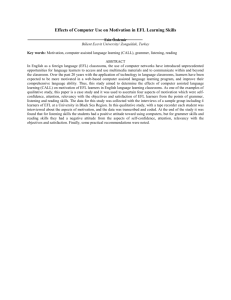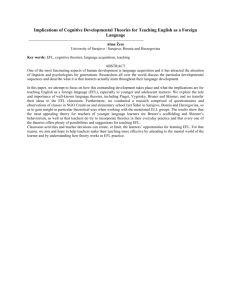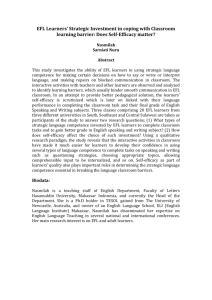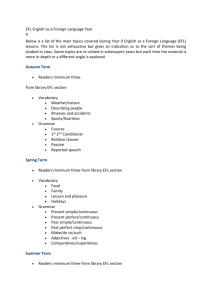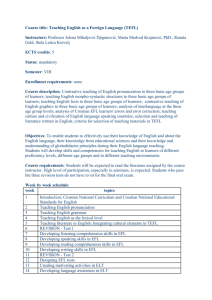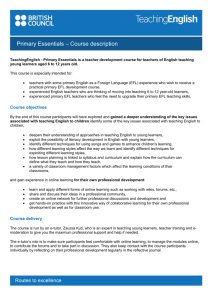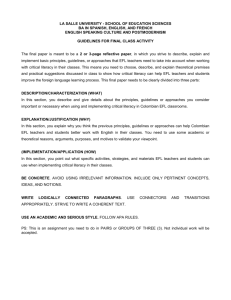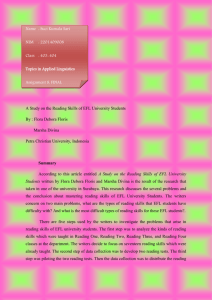poor writing of Palestinian EFL learners
advertisement
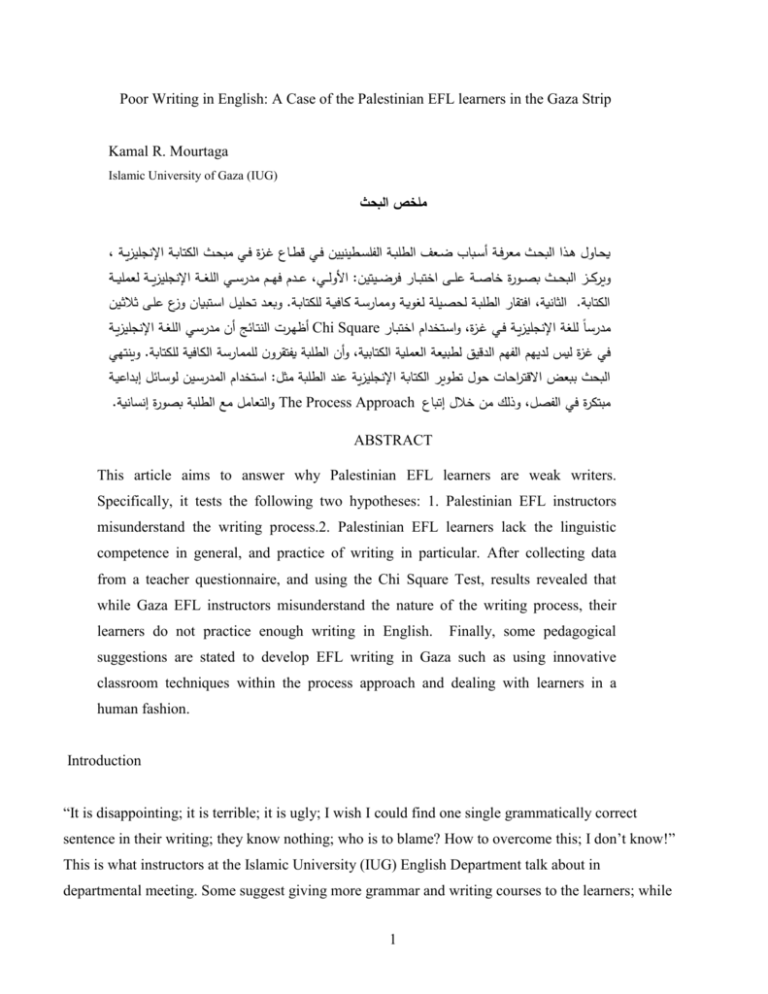
Poor Writing in English: A Case of the Palestinian EFL learners in the Gaza Strip Kamal R. Mourtaga Islamic University of Gaza (IUG) ملخص البحث يةج ااضذ ذ يحاال هذااالبذب محااةذأسباااضذف ااملبذ ااسلذب نيمااضذب طي اانة ةة ذاا ذلناالةذااجلذاا ذأمحااةذب لمااضذب يةج ااضذ سأيي ااضذ بكااجذب مح ااةذم ا بلذخل ااضذ ي اااذبخ ماالبذاب ااة ة ذبم ا ا ذ اا اذاج اااذأ ب ا ا ذب ي ااضذب ذ مسا ذ حيةانذب ا عيل ذ جةذ يااذث ثاة ذ.ذذب ثل يض ذبا قلبذب نيماضذ ح اةيضذ ياضذ أألب اضذكلاياضذ ي لماض.ب لمض يةج اضذ ج ذ فظجاب ذب ال أذف ذأ ب ا ذب ي اضذبChi Square يةج اضذاا ذااجل ذ ب ا خ باذبخ مالب أ ب لًذ ي ضذب ذ.ا ذاجلذ يسذ ةجاذب طجاذب لةقذ نعيسضذب سأييضذب لعيض ذ ف ذب نيمضذيط قب ذ يأألب ضذب لايضذ ي لمض ال نذدع ب ياضذ ذ.بلذد ل يض ذب نيمضذأثن ذب خ باذب أ ب اة ذ يةج ضذ ب محةذعمسضذبالل ببحل ذح هذ ن بذب لمضذب ذ ب سلأنذأعذب نيمضذمThe Process Approach أع بلذا ذب ط ن ذ ل كذأ ذخ هذد ملة ABSTRACT This article aims to answer why Palestinian EFL learners are weak writers. Specifically, it tests the following two hypotheses: 1. Palestinian EFL instructors misunderstand the writing process.2. Palestinian EFL learners lack the linguistic competence in general, and practice of writing in particular. After collecting data from a teacher questionnaire, and using the Chi Square Test, results revealed that while Gaza EFL instructors misunderstand the nature of the writing process, their learners do not practice enough writing in English. Finally, some pedagogical suggestions are stated to develop EFL writing in Gaza such as using innovative classroom techniques within the process approach and dealing with learners in a human fashion. Introduction “It is disappointing; it is terrible; it is ugly; I wish I could find one single grammatically correct sentence in their writing; they know nothing; who is to blame? How to overcome this; I don’t know!” This is what instructors at the Islamic University (IUG) English Department talk about in departmental meeting. Some suggest giving more grammar and writing courses to the learners; while 1 others suggest giving an entrance exam to admit only highly qualified learners. Yes, it is true that writing is difficult as it requires intense, active thinking throughout a continuous productive process in which thoughts and ideas are transferred into written communication, but not just words and letters on paper. However, more often than not, students "believe that writing is a natural gift rather than a learned skill" (Langan, 2000:12). They may add that they do not have the talent of writing. As a result, these students do not write and do not try their best. to do so. Nevertheless, the good news is that writing can be mastered through practice, and all what it needs is special attention from both instructors and students. The problem of the study In the age of Internet, information technology and globalization, writing in English has become so important. However, it seems that many EFL instructors and supervisors in Gaza still misunderstand the essence of the writing process. Many of them use traditional approaches based on memorizations and drilling. In his M.A. thesis, Abu Gazala (2010) stated that the curricula English for Palestine are full of such activities. He added that such activities are important, but they do not help as most learners are unable to produce short sentences, paragraphs and letters to friends. Therefore, this study aims at finding out the possible causes of our learners' poor writing. In other words, the researcher hypothesizes that Palestinian EFL learners are weak writers because of the following two causes (hypotheses): 1. Palestinian EFL instructors misunderstand the writing process. 2. Palestinian EFL learners lack the linguistic competence in general, and practice of writing in particular. Need for the study Unfortunately, most of those who studied the EFL writing of Arab learners such as Kharma, 1987; Atari, 1984; Dushaq, 1986; El-Sayed, 1982; El-Shafie, 1990 and Kamel, 1989 focused on grammatical errors at the sentence level and always attributed these errors to L1 interference. It is clear that these EFL writing scholars neglected more serious causes that are responsible for EFL learners’ weakness in writing such as poor instructors and insufficient practice of writing. Therefore, this study focuses on these two cases and that makes it a distinctive one. Finally, it is hoped that this study will benefit EFL instructors, EFL supervisors, and EFL learners. 2 Purpose of the study This study aims at achieving the following objectives: 1. Investigate whether EFL instructors in Gaza view writing as a process or a product. 2. Investigate whether Gaza EFL instructors understand what writing is about. 3. Investigate whether Gaza EFL learners possess an adequate linguistic competence in general and practice enough writing . To achieve these purposes, the present researcher distributed a questionnaire among 30 male and female EFL instructors from Gaza in the academic year 2009/ 2010. Validity and reliability of the questionnaire As for the validity, the researcher asked his colleagues at the department of English, Islamic University, to suggest, modify and give opinions about the questionnaire items and how far they reflect the importance and purpose of the study. These colleagues, who are experienced teacher educators gave valuable feedback and made slight, but important modifications on two of the items. As for the reliability of the questionnaire, reliability coefficient above 0.7 is considered satisfactory. Measuring the reliability can be achieved by using Kronpakh Alpha coefficient and Half Split Method as in the following table: Split-Half Coefficient personsection correlation Technical 0.6875 skills Spearman-Brown Coefficient pvalue 0.8148 0.000 Cronbach's Alpha 0.8397 The normal range of corrected correlation coefficient 2r/(r+1) is between 0.0 and + 1.0. As shown in the table, the general reliability for all items is equal 0.8135, and the significant (α ) is less than 0.05 . So, all the corrected correlation coefficients are significant at α = 0.05. It can be said that according to the Half Split method, the dispute causes group are reliable. The normal range of Cronbach’s coefficient alpha value is between 0.0 and + 1.0, and the higher values reflect a higher degree of internal consistency. As shown in the table, the general reliability for all items is 0.8397. This range is considered high; the result ensures the reliability of the questionnaire. 3 Definition of terms 1. Poor writing: insufficient word storage to express genuine ideas on paper, and inability to produce correct spelling, grammatically and semantically correct sentences, paragraphs and other short pieces of writing. 2. EFL: English as a Foreign Language 3. Linguistic competence: learners' knowledge of English 4. Traditional approaches to teaching writing: Approaches that focus on weekly routine of memorization, repeated drills and spelling( Marten and Graves, 2003:35). 5. The process approach: It views writing as an interactive, recursive process consisting of many steps where learners interact together and make peer correction, while instructors give feedback between drafts. Limitations of the study This study is limited to a sample of 30 male and female EFL instructors form Gaza City. The study is limited to EFL instructors in governmental junior and senior high schools The study limits itself by investigating the possible writing problems of EFL learners from the point of view of their instructors only. Literature Investigation Actually, there are many approaches to teaching English composition from which instructors can choose: 1) the Controlled-to-Free Approach emphasizes grammar, syntax, and mechanics, and gives preference to accuracy over fluency; 2) the Free-Writing Approach emphasizes quantity of writing rather than quality, and therefore, focuses on fluency rather than accuracy; 3) the ParagraphPattern Approach focuses on paragraph organization and development; 4) the Grammar-SyntaxOrganization Approach focuses on writing as composed of non-separated skills that should be learned sequentially; 5) the Communicative Approach emphasizes the writing and the audience, where student writers should think of themselves as real writers writing to a particular audience; and 6) the 4 Process Approach states that writing is a process of discovering and generating ideas through multiple drafts. However, understanding the nature of the writing process first, and then knowing how to teach it are of great importance. Zamel, who has a remarkable achievement in ESL writing research, states that the composing process is seen as a “non-linear, exploratory, and generative process whereby writers discover and reformulate their ideas as they attempt to approximate meaning” (1983a: 165). Accordingly, both ‘process” and “ideas/meaning” are always emphasized in ESL writing. Based on this definition, EFL writing instructors need to select the most effective approach from a variety of approaches to emphasize this sense. Brender (1998), for instance, talked about “conferencing” as an effective technique in teaching and improving learners’ English composition. He mentioned six types of conferences: collaborative conferencing, small conferencing, third-person conferencing, journaling, emailing, and journaling cum emailing. He stated that this technique is “the most advantageous method for ESL students” and that “students who have three or more conferences in a term not only improve their writing ability, but also significantly improve their listening and speaking skills” (p. 2). The readingwriting approach is another one in which both reading and writing are integrated. Abu Rass (2001) tried out this approach with her freshman EFL students and reported that her students enjoyed it and improved their writing though they complained about the amount of reading. 5 To conclude, the previous approaches/techniques are undoubtedly useful; however, the present researcher believes that every teaching situation is unique. In other words, writing instructors should select the writing approaches/techniques that work well with their students. In addition, they can integrate some techniques with the process approach as the present researcher suggested in the last chapter. Using the most effective approach to teaching EFL writing is not enough if learners do not practice enough writing. Writing is a skill acquired only through practice. It is, like dance and sport, an activity that could be improved only through practice (Andrews, 1999), and through “ the exposure to written texts in a natural process of communication rather than grammatical and rhetorical rules on writing” (Leki, 1992: 17). Therefore, EFL learners do not need more work with language but rather with writing. However, this practice requires that EFL learners have at least some linguistic competence because competence in the organization of written discourse develops late (ElShafie, 1990). This is why many EFL student writers spend a long time looking for the words they need to express already existing ideas in mind. To conclude, the previous approaches/techniques are undoubtedly useful; however, the present researcher believes that every teaching situation is unique. In other words, writing instructors should select the writing approaches/techniques that work well with their students. In addition, they can integrate some techniques with the process approach as the present researcher suggested in the last chapter Methodology Sample and Data collection I obtained much support for the claims on the causes of learners’ weaknesses in EFL writing from a questionnaire distributed among 30 male and female teachers of English whom I randomly selected from many schools in Gaza City (see appendix I). The schoolteachers hold a bachelor degree in English, with 7-15 year teaching experience at both junior and senior high schools. Procedure 6 At the beginning of the school year 2009/2010, the researcher distributed a short questionnaire among 30 EFL schoolteachers in Gaza City, eliciting their response concerning their learners’ weaknesses in EFL writing. The researcher used the Chi Square Test to analyze the teachers’ responses on the yes/no questions in the questionnaire. Results and Discussions The first two questions in the teacher questionnaire test the first hypothesis stated above. Here is the Chi Square product for question 1: ________________________________________________________________________ Response Observed N Expected N p ________________________________________________________________________ Q.1 Yes 24 15.0 No 6 15.0 10.800 .001 Twenty-four out of the 30 schoolteachers answered, “yes” to the first question. This difference, according to the result above is statistically significant since the Chi Square coefficient yields p value of .001. So, in this case, p < .05. This means that the proportion of teachers who said ‘yes’ to the first question was much larger than the proportion of teachers who said ‘no’. In other words, schoolteachers give their learners enough time to write many drafts, and they also give them enough feedback between drafts. Accordingly, they seem to follow the process approach in their teaching of EFL writing which is highly recommended by scholars. Unfortunately, their simple definitions stated in the second question show that their view of writing does not exceed correct grammar and mechanics. In other words, while they view writing as a process, as shown above, they still emphasize the form over the content in their learners’ writing. This emphasis was clear in their definitions, where they frequently used items such as, writing is a skill, a way to, a mechanism of, a reflection of, a system of, correct punctuations, good sentences, good spelling, suitable words, etc. Only five of them of them mentioned that writing is a process, two mentioned words such as “thoughts” and “ideas”, while most of the definitions did not reflect how writing is carried out. Therefore, it is clear that Gaza schoolteachers misunderstand the nature of the writing process. 7 Gaza EFL instructors' narrow view of the writing process might have its roots in their mother tongue (Arabic). It is well known that Arabs in general are in love with Arabic, and when they write in Arabic, they are interested in composing a flowery language of a complicated style, even when this is at the expense of the meaning intended. Therefore, when Arab EFL instructors look for errors not for ideas, they in fact give their students the impression that writing is grammatically correct sentences; and when they give feedback at the final (only) draft, they provide their learners with a wrong definition of writing as if it were a one-way process. What I would like to conclude here is that although there are other factors that contribute in the problem of writing, most often, those teachers are responsible, and the problem begins from them not from the learners. To clarify more, let us look at the following figure: Teachers’ definition of writing, Instructional approaches teachers use, Student writers’ definition of writing, Student writers’ writing strategies, Student writers’ success/failure at writing. According to this figure, any writing approach teachers use will depend on how they view writing. If they view it as a product, then the product approach will be their way of teaching writing. Consequently, their students will view writing as a product, and their writing strategies will be formed accordingly. This might determine the success or failure of these learners. Here are some examples of their definitions quoted as they are stated by these teachers: --Having a good idea of the topic, arrange the ideas mentally, then write about each idea using good English. --Writing is a system that helps students to use their vocabulary and information to write sentences good at structure and command. --In writing, we focus on writing short paragraphs. --Sometimes students are asked to use the mini-dictionary to find out the meaning of the same words in English. --Writing is a skill that learn students how to write correctly. 8 --Writing is a mechanism in which students use it for improving their language, spelling, reading, and letter sound matching. Question three and four in the questionnaire test the second hypothesis. Here is the product of Chi Square Test for question 3: _____________________________________________________________________ Response Observed N Expected N p _____________________________________________________________________ Q.3 Yes 5 15.0 No 25 15.0 13.3 .000*** In the above table, the difference between the observed frequencies of ‘yes’ and ‘no’ (column 2) and the frequencies that would be expected (column 3) were statistically significant because the Chi Square coefficient yielded p values < .05. This means that the proportion of teachers who said ‘no’ to the item was much larger than the proportion of teachers who said ‘yes’. Consequently, EFL learners in Gaza do not have the sufficient competence in and practice of EFL writing. Therefore, the second hypothesis was confirmed. The insufficient competence in and practice of EFL writing of our learners is supported by the results of the fourth question in the questionnaire. The average page number given by these teachers was 2.15 page a week, which is nothing for a foreign learner who is seeking to develop his/her competence in EFL writing. Accordingly, teachers believe that their students do not practice enough writing in English, and therefore, the above assumption was confirmed. What is left in the following section is the BIG question: how should writing be taught in order to solve the problem? This section includes some ideas and techniques proposed by some contemporary scholars in the field. Summary and Suggestions Before starting teaching, writing instructors are to be reminded that teaching is a humanistic career, and that about 50% of learners, according to many studies, fail to learn because their human needs (love, power, freedom, etc) are not met, and therefore, they refrain from working hard (Maden, 1988). They also need to remember that they are not error hunters but that their job is to create nonthreatening classrooms by convincing learners that they can write, that writing could be learned, and that nobody’s writing is perfect. 9 Writing is a skill acquired only through practice. It is, like dance and sport, an activity that could be improved through practice (Andrews, 1999), and through “ the exposure to written texts in a natural process of communication rather than grammatical and rhetorical rules on writing” (Leki, 1992: 17). Therefore, our EFL learners do not need more work with language but rather with writing. To ask learners to start practicing writing, “the first lesson in teaching composition is that the writer must find his or her own subject” (Graves, 1999: 115) Graves adds that the “creative energy” which is the discovery experience is not found in English textbooks, but it is in our writers’ minds. Through giving choices to our student writers, we, in fact, teach them to take responsibility for their own learning, which is the only way to let them deeply engaged to their education (Rief, 1999). One choice that students might and should be encouraged to choose is “stories”. The importance of stories in the teaching of writing lies in the fact that writing itself is personal (Graves, 1999). Murphy (1999) writes, The stories we tell will be deeply valuable to us, that in telling them we will define ourselves and that we know, that in learning them we will remember who we are and what teaching and learning have come to mean to us. (41) To proceed in their teaching of writing, Gaza EFL instructors need to update their knowledge by getting acquainted with the current trends in the field. The process approach to writing, for instance, has a long time been used in many parts of the world with innovative classroom techniques such as writing in silence, journal writing, free writing, reflection to generate creativity, meditation, concentration, relaxation, deep breathing, etc. Therefore, the recent research in EFL/ESL writing is very important to these teachers in order to make a shift in their definition of writing and errors. Sometimes mere reading of the recent research is not enough because in most cases, “these teachers would be less likely to abandon more traditional views of teaching writing and more likely to resist the de-emphasis on grammar characteristics of process methodologies (Leki, 1992: 7). Therefore, it is important that these teachers get some training in using the process approach in teaching writing. When using the process approach, writing teachers can follow steps with their student writers such as topic listing, pre-writing, drafting, revision, editing, proofreading, and reflection. However, these steps are not linear because the process approach is recursive in nature. This means learners 10 can do any of these things at any time during the process of producing their text. When writing instructors follow the process approach, learners will enjoy the interactive recursive characteristics of the approach. They will benefit from each other through beer response or peer editing groups with guidance from their instructors. In addition, they will benefit from the in-between draft feedback because they will incorporate it into their writing. Following the process approach does not mean focusing on rules of correction when evaluating student writers’ composition. First of all, research show that formal grammar instructions and error correction have little effect on learners’ writing quality and on their ability to reduce the number of errors in their writing (Leki, 1992, Hartwell, 1999). In addition, it is believed that as learners are exposed to more of the L2 and practice more EFL writing, many of the errors they commit will naturally disappear. Therefore, it is important that teachers look for ideas and make feedback on content first. Finally, EFL writing instructors should not forget that learners should be treated with sensitivity and consideration. Thus, criticizing their learners’ composition should be avoided while praising it is essential. Such praise will create trust through which we, as EFL writing instructors, will learn from our learners who have a lot to say and write. It is through trust that our learners will write and write and write, and it is writing that makes them feel brave, enhances self-esteem and confidence, increases positive feelings, and makes them think of themselves as writers. 11 Works Cited Abu Ghazala, I. (2010). The effect of using a comprehensive approach for teaching high frequency words on developing the writing skills of seventh graders in Gaza. Unpublished M.A. thesis. Islamic University of Gaza, Gaza. Abu Ras, R. (2001). Integrating reading and writing for effective language teaching [Electronic version]. FORUM, 39(1), 30 – 34. Andrews, S. (1999). Writing as performance. In R. Graves (Ed.), Writing, teaching, learning: A Sourcebook. (Pp.258 – 266). NH: Boynton/Cook Publishers, Inc. Atari, O. (1984). A contrastive analysis of Arab and American university students’ strategies in accomplishing written discourse functions: Implication for EFL. Dissertation Abstract International, 44, 30 – 47. Brender, A. (1998, June 12). Conferencing. An interactive way to teach writing. The Language Teacher on Line, 22. Retrieved September 21, 2000 from http://Langue.hyper.chubu. ac.jp/jalt/pub/tlt/98/jul/brender.hml Dushaq, M. (1986). An Investigation into stylistic errors of Arab students learning English for Academic purposes. English for Specific Purposes, 5, 27 – 39. El-Sayed, A. (1982). An investigation into the syntactic errore of Saudi freshmen’s English composition. Unpublished doctoral dissertation, Indiana University of Pennsylvania, Indiana. El-Shafie, A. (1990). English language development of Arab twelfth grade students: Case studies of six EFL writers. Unpublished doctoral dissertation, Indiana University of Pennsylvania, Indiana. Graves, R. (1999). What I learned from Verle Barnes. In R. Graves (Ed.), Writing, teaching, learning: A Sourcebook. (Pp. 113 – 118). NH: Boynton/Cook Publishers, Inc. Hartwell, P. (1999). Grammar, grammars and the teaching of grammar. In R. Graves (Ed.), Writing, teaching, learning: A Sourcebook. (Pp.197 – 219). NH: Boynton/Cook Publishers, Inc. Kamel, J. (1989). Argumentative writing by Arab learners of English as a foreign language and second language: An empirical investigation of contrastive rhetoric. Unpublished doctoral dissertation, Indiana University of Pennsylvania, Indiana. 12 Kharma, N. (1987). Arab students problems with the English relative clauses. IRAL, 25, 257 – 266. Langan, J. (2000). College writing skills. Washington: McGraw-Hill Companies, Inc Leki, I. (1992). Understanding ESL writers: A guide for teachers. NH: Boynton/Cook Publishers, Inc. Madden, L. (1988). Improve reading attitudes of poor readers through cooperative reading teams. The Reading Teacher, 42, 194 – 199. Marten, C. and Graves, D. (2003). Word crafting: Teaching spelling grades k-6. Portsmouth, NH: Heinemann Murphy, R. (1999). On stories and scholarship. In R. Graves (Ed.), Writing, teaching, learning: A Sourcebook. (Pp. 35 – 43). NH: Boynton/Cook Publishers, Inc. Rief, L. (1999). Writing for life: Language arts in the middle. In R. Graves (Ed.), Writing, teaching, learning: A Sourcebook. (Pp. 45 – 49). NH: Boynton/Cook Publishers, Inc. Zamel, V. (1983a). The composing process of advanced ESL students: Six case studies. TESOL Quarterly, 17, 165 – 187. 13 Appendix I Questionnaire on writing problems of Palestinian EFL learners Dear Colleagues, I would greatly appreciate your response to the following questions, which don’t take much time, and are easy to answer. It is only for research purposes and has nothing to do with the evaluation of the course or the teacher. Do not write your name, teacher’s name or the course section number. 1. Do you allow your learners to write in English the same topic again and again (writing drafts) with some feedback in between? Yes No 2. In the space bellow, define briefly what writing is. ---------------------------------------------------------------------------------------------------------------------------------------------------------------------------------------------------------------------------------------------------------------------------------------------------------------------- 3. Do you think your learners have a sufficient competence in and practice of writing in English? Yes No 4. Roughly, how many pages of English do your learners write a week? ------------ The Researcher Dr. Kamal R. Mourtaga Islamic University of Gaza 14

